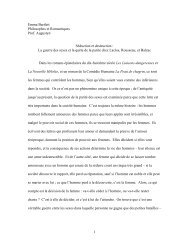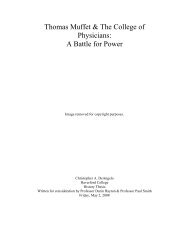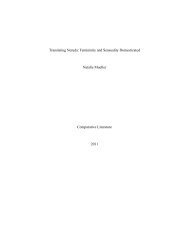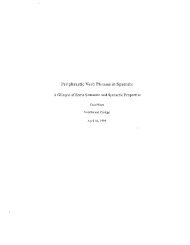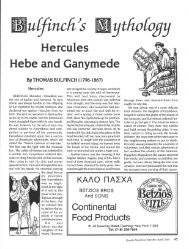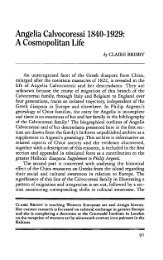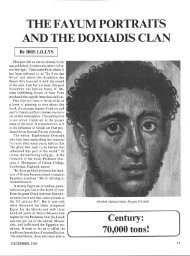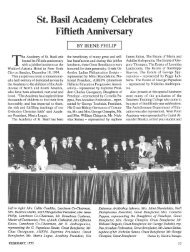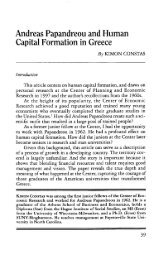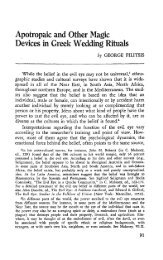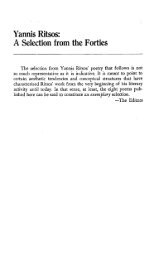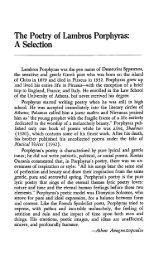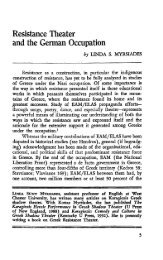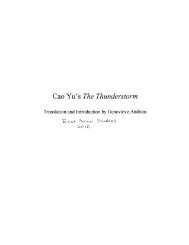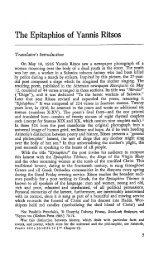Mythistorema - Triceratops Home
Mythistorema - Triceratops Home
Mythistorema - Triceratops Home
You also want an ePaper? Increase the reach of your titles
YUMPU automatically turns print PDFs into web optimized ePapers that Google loves.
6o JOURNAL OP THE HELLENIC DIASPORA<br />
enjoying our reward." In contrast, the protagonist has lived "the life<br />
which was given to [him] to live," and he seems to feel remorse for<br />
that.<br />
The epigraph of the poem, "Quid nACcCrIyein opacissimus?" brings<br />
together the various aspects of this poem. The green leaves wrap around<br />
the woman he is with and he is losing her. "Under the heavy planes" is<br />
buried symbolically a person whose memory shadows the protagonist's life<br />
like an enormous tree and frustrates his attempt to bring his journey to<br />
a successful end.<br />
16<br />
Poem "16" of <strong>Mythistorema</strong>, with the epigraph "The name—Orestes,"<br />
presents the symbolic journey as a perpetual cyclical wandering that leads<br />
nowhere, since the protagonist is involved in a vicious circle of hubris<br />
from which he cannot escape.<br />
This circle is symbolized by the circular movement of a chariot as<br />
Orestes is presented participating in a chariot race in Delphi. Like the<br />
epigraph of the poem, the chariot race is taken from Sophocles' Electra."<br />
Seferis uses it as a metaphor for Orestes' predicament, his involvement<br />
in the perpetuation of crime in the Atreus family by the slaying of his<br />
mother."<br />
Again, again into the track, once more into the track !<br />
How many turns, how many laps of blood, how many black<br />
Circles of faces watching: the people watching me<br />
Who watched me when, upright in the chariot,<br />
I raised my hand, brilliant, and they roared applause.<br />
Certain aspects of this poem become more understandable by comparison<br />
with the section "Wednesday" of the sequence "Notes for a Week,"<br />
with which it has several similarities. The central similarity is the vicious<br />
circle in which the protagonists are caught up and which they wish to<br />
break. In both poems the protagonist is surrounded by a crowd of spectators,<br />
and he feels that he is constantly under observation. Also, in both<br />
poems, the only way the circle could be broken is through love. In<br />
"Wednesday" this is explicitly stated: "If we were to love, the circle<br />
""What becomes of the shady plane-tree grove?" Pliny, Letters, 1.3.<br />
"Orestes, admonished by the Delphic oracle to avenge his father's murder, goes<br />
to Mycenae and sends his old tutor to the palace to announce to Clytemnestra that<br />
Orestes has been killed in a chariot race at the Pythian games.<br />
"Modern Orestes' predicament is also inlirectly presented in the section "Saturday"<br />
of "Notes for a Week," where the actor interrupts the reenactment of an ancient<br />
tragedy and questions his role, which requires him to murder for justice.



